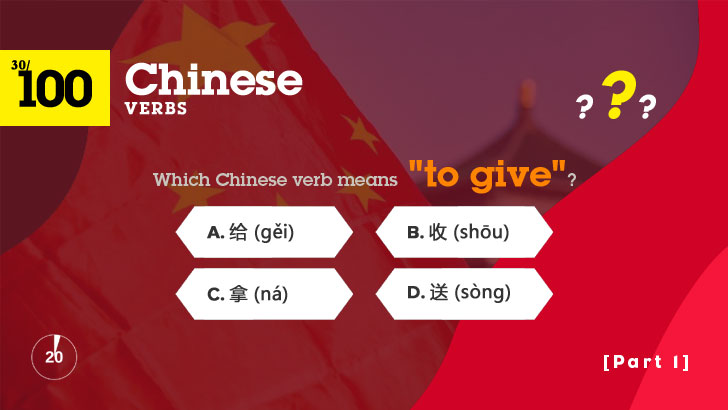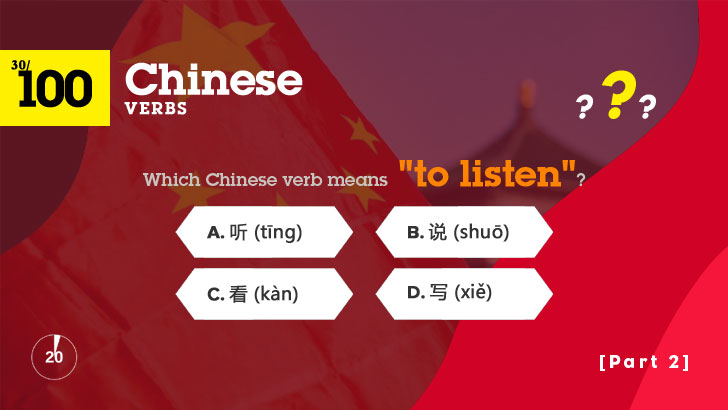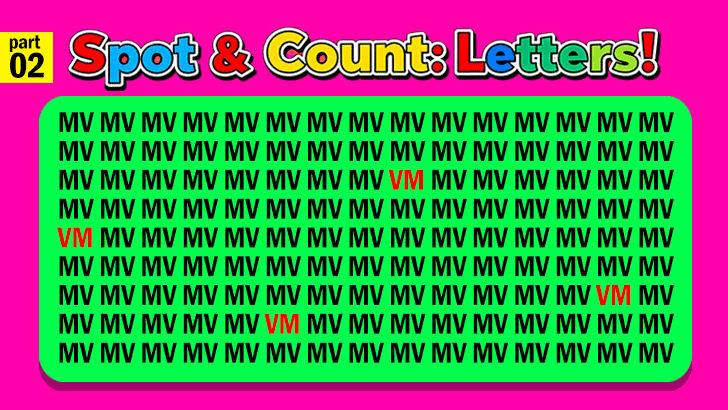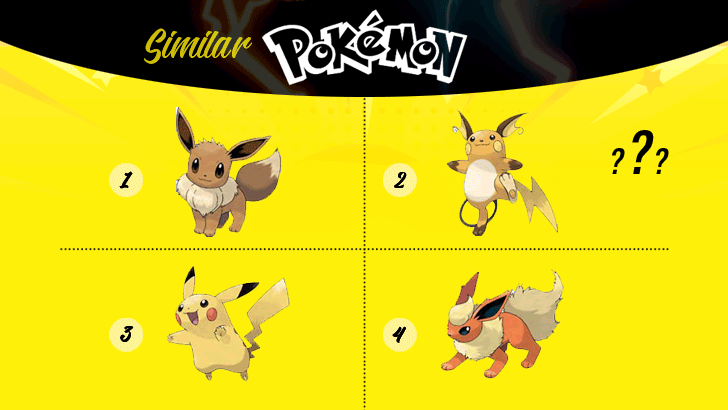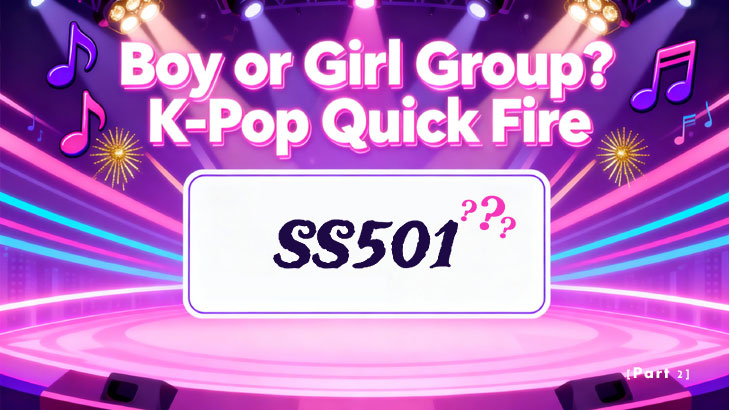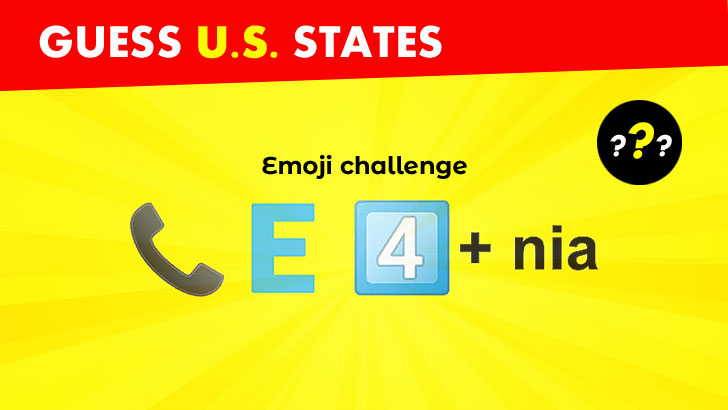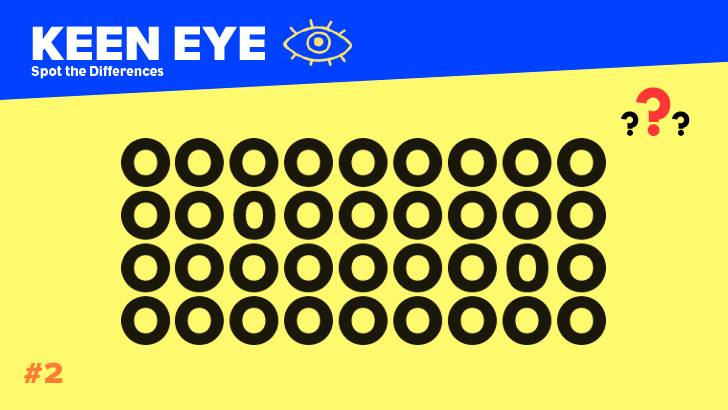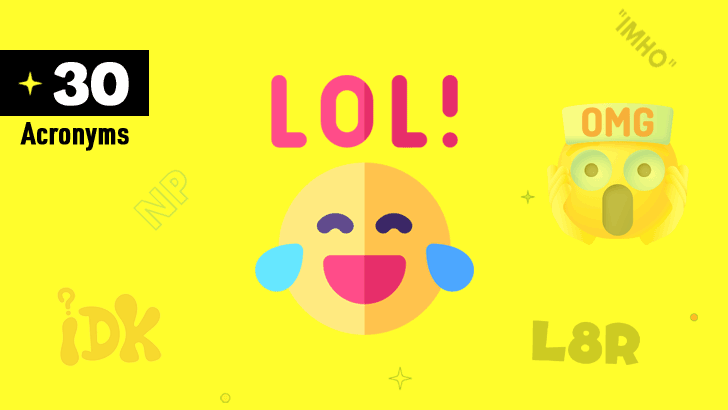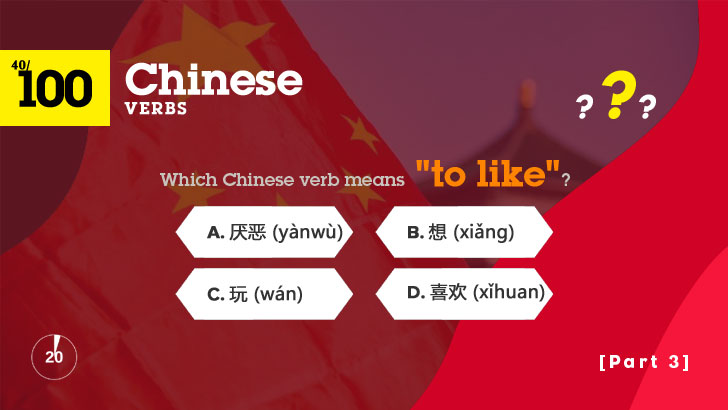
About This Quiz
Do you really know how to use Chinese verbs?
They’re the most basic verbs you use every day, right on page one of the textbook. But in a recent survey, 90% of learners missed at least 10. Some didn’t even realize they got them wrong.
The problem isn’t that they’re hard—it’s that everyone thinks they’re easy.
Basic ≠ safe, familiar ≠ correct.
Go ahead. Prove you’re in the top 10%. ✨
Bet you won’t get them all right.
需要 (xūyào)?
[B] to need | Refers to requiring something for a particular purpose. "我需要休息" (wǒ xūyào xiūxí) means "I need rest".
亲 (qīn)?
[A] to kiss | Refers to expressing affection or love through a kiss. "亲吻" (qīn wěn) means "to kiss".
回答 (huídá)?
[C] to answer | Refers to responding to a question or inquiry. "回答问题" (huídá wèntí) means "to answer a question".
买 (mǎi)?
[A] to buy | Refers to purchasing something in exchange for money. "买东西" (mǎi dōngxi) means "to buy things".
卖 (mài)?
[A] to sell | Refers to exchanging something for money. "卖东西" (mài dōngxi) means "to sell things".
找 (zhǎo)?
[C] to look for | Refers to searching for something or someone. "找工作" (zhǎo gōngzuò) means "to look for a job".
拉 (lā)?
[D] to pull | Refers to exerting force to move something toward you. "拉车" (lā chē) means "to pull a cart".
推 (tuī)?
[A] to push | Refers to applying force to move something away from you. "推门" (tuī mén) means "to push the door".
送 (sòng)?
[B] to send | Refers to delivering something or sending someone. "送礼物" (sòng lǐwù) means "to give a gift".
猜 (cāi)?
[A] to guess | Refers to making an estimate or conjecture. "猜谜语" (cāi míyǔ) means "to guess a riddle".
熄 (xī)?
[D] to extinguish | Refers to putting out a fire or light. "熄火" (xī huǒ) means "to extinguish the fire".
认为 (rènwéi)?
[A] to think | Used to express an opinion or judgment. "我认为" (wǒ rènwéi) means "I think".
骗 (piàn)?
[C] to deceive | Refers to misguiding someone intentionally. "骗人" (piàn rén) means "to deceive people".
教 (jiāo)?
[A] to teach | Refers to instructing someone in a subject or skill. "教书" (jiāo shū) means "to teach a class".
饿 (è)?
[D] hungry | Refers to the sensation of needing food. "我饿了" (wǒ è le) means "I'm hungry".
发 (fā)?
[D] to send | Refers to sending something, such as a message or an item. "发信息" (fā xìnxī) means "to send a message".
试 (shì)?
[C] to try | Refers to making an attempt at something. "试试" (shì shì) means "to give it a try".
想 (xiǎng)?
[B] to want | Can also be used to express a desire for something. "我想吃" (wǒ xiǎng chī) means "I want to eat".
感觉 (gǎnjué)?
[A] to feel | Refers to both physical and emotional sensations. "感觉到" (gǎnjué dào) means "to feel something".
笑 (xiào)?
[A] to laugh | Refers to the act of expressing amusement or joy. "笑了" (xiào le) means "laughed".
哭 (kū)?
[D] to cry | Refers to shedding tears, often due to emotion. "哭了" (kū le) means "cried".
刷 (shuā)?
[A] to brush | Refers to using a brush for cleaning or grooming. "刷牙" (shuā yá) means "to brush teeth".
担心 (dānxīn)?
[C] to worry | Refers to feeling anxious or troubled about something. "我很担心" (wǒ hěn dānxīn) means "I'm very worried".
知道 (zhīdào)?
[D] to know | Refers to being familiar with something. "我知道" (wǒ zhīdào) means "I know".
说明 (shuōmíng)?
[A] to explain | Refers to giving details to make something clear. "说明情况" (shuōmíng qíngkuàng) means "to explain the situation".
同意 (tóngyì)?
[D] to agree | Refers to being in harmony or concurrence with something. "我同意" (wǒ tóngyì) means "I agree".
反对 (fǎnduì)?
[A] to oppose | Refers to being against something or someone. "反对意见" (fǎnduì yìjiàn) means "to oppose an opinion".
结束 (jiéshù)?
[B] to end | Refers to bringing something to a conclusion. "活动结束" (huódòng jiéshù) means "the event ends".
开始 (kāishǐ)?
[A] to begin | Refers to starting an action or event. "开始工作" (kāishǐ gōngzuò) means "to start work".
明白 (míngbái)?
[C] to understand | Refers to fully understanding something. "我明白了" (wǒ míngbái le) means "I understand clearly".
观察 (guānchá)?
[B] to observe | Refers to looking closely at something for a period of time. "观察细节" (guānchá xìjié) means "to observe the details".
认识 (rènshi)?
[D] to know (a person) | Refers to being acquainted with someone. "我认识他" (wǒ rènshi tā) means "I know him".
握手 (wòshǒu)?
[C] to shake hands | Refers to the act of clasping hands as a greeting or agreement. "我们握手" (wǒmen wòshǒu) means "let's shake hands".
讨论 (tǎolùn)?
[A] to discuss | Refers to talking about something in detail. "讨论问题" (tǎolùn wèntí) means "to discuss a problem".
相信 (xiāngxìn)?
[A] to believe | Refers to having faith or confidence in something. "我相信你" (wǒ xiāngxìn nǐ) means "I believe in you".
担任 (dānrèn)?
[C] to take on (a role) | Refers to assuming responsibility for something. "担任职务" (dānrèn zhíwù) means "to take on a position".
期待 (qīdài)?
[A] to look forward to | Refers to anticipating something positively. "我期待见到你" (wǒ qīdài jiàn dào nǐ) means "I look forward to seeing you".
相遇 (xiāngyù)?
[D] to meet | Refers to encountering someone, often unexpectedly. "我们相遇了" (wǒmen xiāngyù le) means "we met".
关心 (guānxīn)?
[A] to care about | Refers to being concerned or compassionate toward someone. "关心家人" (guānxīn jiārén) means "to care for family".
研究 (yánjiū)?
[D] to research | Refers to deep investigation or study on a particular subject. "做研究" (zuò yánjiū) means "to do research".
Your Scorecard
100 Chinese Verbs Face-Off (Part 3)
- Correct
- Correct Rate%Avg Correct Rate
- L1Difficulty Level1xPoints
- Get Points
Perfect100% Excellent≥90% Very Good≥80% Good≥70% Passed≥60% Failed≤50%
- 100 Chinese Verbs Face-Off (Part 1)
- 100 Chinese Verbs Face-Off (Part 2)
- 100 Chinese Verbs Face-Off (Part 3)
Related Quizzes
More from QuizABCD
-
![Spot the Differences: Letters Edition (2)]()
Spot the Differences: Letters Edition (2)
15 QuestionsPlay Quiz -
![Guess the 'E' Movies from Images (2)]()
Guess the 'E' Movies from Images (2)
25 QuestionsPlay Quiz -
![Name That Missing 90s/00s Flick! (2)]()
Name That Missing 90s/00s Flick! (2)
23 QuestionsPlay Quiz -
![Pokémon Look-Alike: Pick 1 of 4]()
Pokémon Look-Alike: Pick 1 of 4
50 QuestionsPlay Quiz -
![Name the 100 Greatest Actresses (Part 1)]()
Name the 100 Greatest Actresses (Part 1)
30 QuestionsPlay Quiz -
![Name That Sandler Movie: Role + Year = ? (3)]()
Name That Sandler Movie: Role + Year = ? (3)
17 QuestionsPlay Quiz -
![Boy or Girl Group? K-Pop Quick Fire (2)]()
Boy or Girl Group? K-Pop Quick Fire (2)
30 QuestionsPlay Quiz -
![Guess the Band from the Pic (1)]()
Guess the Band from the Pic (1)
18 QuestionsPlay Quiz
This week-
![50 States Map Quiz, No Stress—Go!]()
50 States Map Quiz, No Stress—Go!
000,000 Plays / 0,000 LikesPlay Quiz -
![50 State Flags Quiz – Part 1]()
50 State Flags Quiz – Part 1
000,000 Plays / 0,000 LikesPlay Quiz -
![]()
Guess the States from EMOJIS! (1)
000,000 Plays / 0,000 LikesPlay Quiz -
![Name Every NFL Team Logo! - Part 1]()
Name Every NFL Team Logo! - Part 1
000,000 Plays / 0,000 LikesPlay Quiz -
![Name That NBA Logo! (All 30) - Part 1]()
Name That NBA Logo! (All 30) - Part 1
000,000 Plays / 0,000 LikesPlay Quiz -
![Spot the Differences: Test Your Keen Eye!]()
Spot the Differences: Test Your Keen Eye!
000,000 Plays / 0,000 LikesPlay Quiz -
![]()
100 Greatest Music Artists Quiz (1)
000,000 Plays / 0,000 LikesPlay Quiz -
![50 Greatest TV Characters – Name ’Em!]()
50 Greatest TV Characters – Name ’Em!
000,000 Plays / 0,000 LikesPlay Quiz -
![U.S. Presidents in Order Quiz (10s)]()
U.S. Presidents in Order Quiz (10s)
000,000 Plays / 0,000 LikesPlay Quiz -
![30 Common Chat Acronyms Quiz]()
30 Common Chat Acronyms Quiz
000,000 Plays / 0,000 LikesPlay Quiz
